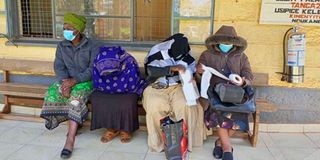Victims or criminals? The dark side of FGM prosecutions

FGM suspects outside a Mukurwe-ini court on March 5, 2022.
What you need to know:
- The law recommends a prison sentence of not less than three years, or a fine of Sh200,000, or both.
- A person who causes the death of a girl through FGM can be sentenced to life imprisonment.
In June 2021, three women were arraigned in Kilgoris and jointly charged with two female genital mutilation offences.
The three were charged with allowing the outlawed practice to be performed on them while having full knowledge that it was illegal, according to the Prohibition of Female Genital Mutilation (FGM) Act of 2011.
They also faced a second charge of failing to report the illegal act. The offences were allegedly committed on May 31, 2021, at Ilkerin in the Murkan area of Transmara East. They denied the charges and were remanded at Kisii Prisons awaiting the mention of their case. Police are said to have received a tip-off from the public about three women who were hidden in a home and believed to have undergone the cut and moved to the home.
They arrested the trio, who were recuperating at the home. The circumciser and the homeowner escaped on seeing the police approaching. Although the practice was outlawed in Kenya in 2011, it is still rampant in the communities, with over 37 of the 44 ethnic groups in Kenya still practising FGM.
The plight of the three women is well captured in a new report launched by the Clooney Foundation for Justice’s Trial Watch that accuses the Kenyan authorities of using the Prohibition of FGM Act to disproportionately punish victims instead of perpetrators. The report says the Kenyan authorities have turned the law against the people it should protect.
While the Kenyan authorities and civil society have made great strides towards combating FGM, the report finds victims under legal threat for allegedly “procuring” or “failing to report” their own mutilation.
Prepared in partnership with the American Bar Association Center for Human Rights, the report is based on in-person trial monitoring and a review of 68 cases across Kenya. In these cases, over 55 per cent of defendants were women and girls who were FGM victims.
By contrast, only six per cent of those prosecuted were individuals who performed FGM and 16 per cent were owners of premises where FGM was carried out. The report also finds that more broadly, courts are finding victims guilty: it identifies 44 FGM victims, including seven young girls who were convicted of undergoing mutilation.
Under the law, the mandatory minimum sentence these women face is Sh200,000 or three years in prison. “The PFGM Act must be amended to ensure it can never be used to prosecute victims. In the meantime, all charges against survivors under the act must be dropped and convictions vacated,” said Trial Watch Expert Satang Nabaneh, the director of programmes at University of Dayton Human Rights Centre and co-founder and board member of Think Young Women.
While Kenyan authorities and civil society have made great strides towards combating FGM, the report finds victims under legal threat for allegedly “procuring” or “failing to report”.
Section 24 of the Act, which criminalises failing to report FGM to law enforcement, was invoked in almost half the observed cases and often against victims, even though other jurisdictions around the world have understood that such a duty to report is meant to cover third parties.
“A law meant to eliminate FGM should not result in the disproportionate criminalisation of the victims of this harmful act. Those women and girls need help, including medical and psychosocial assistance, not a prison cell and a legal process that exacerbates the harm already done to them,” said Hermine Kembo Takam Gatsing, African Union special rapporteur on child marriage and other harmful practices.
Authorities routinely perform genital exams on women and girls after arresting them to find out whether they underwent FGM, but the report found no indication that these tests were done with informed consent. Instead, there were indications that “prosecutors heavily rely on genital examinations to achieve a conviction and do not think they are likely to sustain a conviction without one.”
A 2020 report by Unicef states that Kenya’s progress towards the eradication of FGM is stronger than that of other nations in eastern or southern Africa. It adds that more than four million girls and women in the country have undergone FGM.
FGM offences include aiding or abetting the practice, possessing mutilation tools, and failing to report a perpetrator. The law recommends a prison sentence of not less than three years, or a fine of Sh200,000, or both. A person who causes the death of a girl through FGM can be sentenced to life imprisonment.





